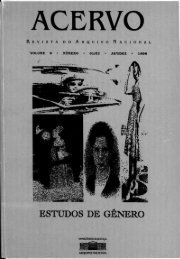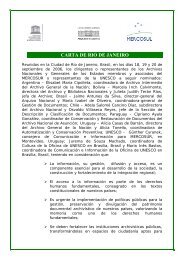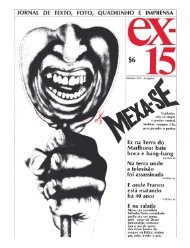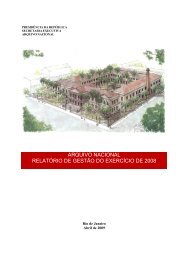You also want an ePaper? Increase the reach of your titles
YUMPU automatically turns print PDFs into web optimized ePapers that Google loves.
A C E<br />
maço 3.133, réu: Cervejaria Bavária, autor: Banco de Depósitos e Descontos, liquidação<br />
forçada, 1900.<br />
27.Corte de Apelação, n. 3.090, maço 3.115, réu: Companhia de Fiação e Tecidos Santa Maria,<br />
liquidação forçada, 1909.<br />
28.Corte de Apelação, Juízo Comercial do Tribunal Civil e Criminal, n. 708, maço 268, réu:<br />
Estrada de Ferro Leopoldina, autor: Edward Herdman, liquidação forçada, 1897.<br />
29.Viação Férrea Sapucaí, proposta de concordata aos debenturistas e mais credores da<br />
Companhia Viação Férrea Sapucaí, abril 14, 1899, em Bolsa de Valores de Rio de Janeiro,<br />
sociedades anônimas, transportes, notação n. 6.498 a 6.527, caixa 406.<br />
30.Para ganhar poder durante as falências, os debenturistas ingleses formavam rapidamente<br />
associações; normalmente um banco oferecia representar a associação cobrando uma<br />
comissão sobre o valor recuperado. O mesmo acontecia quando governos latino-americanos<br />
declaravam moratória da dívida. Detalhes da formação de uma associação de credores ingleses<br />
podem ser achados em Corte de Apelação, Juízo Comercial do Tribunal Civil e Criminal, n.<br />
708, maço 268, réu: Estrada de Ferro Leopoldina, autor: Edward Herdman, liquidação forçada,<br />
1897.<br />
31.Corte de Apelação, Juízo Comercial do Tribunal Civil e Criminal, n. 113, maço 3.046, réu:<br />
Companhia de Ferro Carril Carioca, autor: Veiga & Cia e Terra & Irmão, liquidação forçada,<br />
1908.<br />
A B S T R A C T<br />
The present essay analyses the importance of the commercial courts in enforcing bankruptcy<br />
laws during the Old Republic (1889-1930) in the city of Rio de Janeiro, capital of Brazil at that<br />
time. The argument is that the enforcement of bankruptcy laws was very important to determine<br />
the success of bond issues as a way for firms to raise capital in the stock market. The success of<br />
bonds depended to a large extent in the confidence investors had that they were going to receive<br />
some money back in case of bankruptcy of the firms. During the republic joint stock companies<br />
gathered an important part of their capital through bond issues. I present some evidence of<br />
bankruptcy court cases for joint stock companies found at the National Archive in Rio de Janeiro,<br />
from their analysis I show that the courts usually enforced bankruptcy laws and that creditors<br />
usually got paid a fraction or all of their credits after bankruptcy. Thus the courts reduced the<br />
risk to investors by insuring that they would get part or all their money back, helping to make<br />
bonds an attractive asset that could be sold easily by firms to get credit. The final conclusion is<br />
that laws and courts are important for economic growth, and I suggest that the study of the<br />
judiciary should be extended to understand other institutional features that shaped Brazil’s history.<br />
pág.68, jul/dez 2002

















